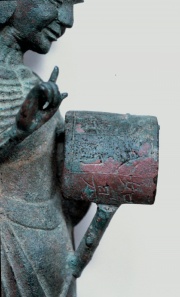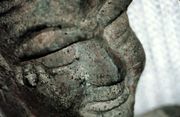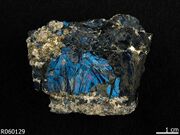Difference between revisions of "Copper sulfide"
Jump to navigation
Jump to search
| (7 intermediate revisions by 2 users not shown) | |||
| Line 1: | Line 1: | ||
| − | [[File:22.407_blk.spts2.jpg|thumb|Copper sulfide corrosion]] | + | [[File:22.407_blk.spts2.jpg|thumb|Copper sulfide corrosion<br>MFA# 22.407]] |
== Description == | == Description == | ||
| − | + | [[File:22.407_blk.spts.jpg|thumb|Black corrosion details<br>MFA# 22.407]] | |
Dark blue hexagonal crystals or black powder. Copper sulfide occurs in nature as the blue mineral [[covellite]], that turns black in air. It is used in antifouling paints and in textile dying with [[aniline black]]. Copper sulfide was probably used as a black pigment in antiquity (Orna et al 1980). Spots of black copper sulfide can sometimes be seen on corroded [[bronze|bronzes]]. | Dark blue hexagonal crystals or black powder. Copper sulfide occurs in nature as the blue mineral [[covellite]], that turns black in air. It is used in antifouling paints and in textile dying with [[aniline black]]. Copper sulfide was probably used as a black pigment in antiquity (Orna et al 1980). Spots of black copper sulfide can sometimes be seen on corroded [[bronze|bronzes]]. | ||
| Line 7: | Line 7: | ||
covellite (Pigment Blue 34; CI 77450;); cupric sulfide; indigo copper; kopersulfide (Ned.) | covellite (Pigment Blue 34; CI 77450;); cupric sulfide; indigo copper; kopersulfide (Ned.) | ||
| + | [[File:Covellite Raman RRUFF R060129.png|thumb|Raman spectrum of covellite<br>Image Credit:[https://rruff.info/covellite/display=default/R060129 RRUFF]]] | ||
| + | == Risks == | ||
| − | [[[ | + | * Irritating to skin and eyes. |
| + | * Highly toxic by ingestion. | ||
| + | * Can emit highly toxic hydrogen sulfide gas it exposed to high heat or acid. | ||
| + | [[File:Covellite R060129 Sample Photo 3484 M.jpg|thumb|Covellite<br>Image Credit: [https://rruff.info/covellite/display=default/R060129 RRUFF]]] | ||
| − | == | + | ==Physical and Chemical Properties== |
Soluble in nitric acid. Insoluble in water, ethanol, dilute acids, alkalis. | Soluble in nitric acid. Insoluble in water, ethanol, dilute acids, alkalis. | ||
| Line 23: | Line 28: | ||
|- | |- | ||
! scope="row"| Melting Point | ! scope="row"| Melting Point | ||
| − | | 220 (dec) | + | | 220 C (dec) |
|- | |- | ||
! scope="row"| Density | ! scope="row"| Density | ||
| − | | 3.9-4.6 | + | | 3.9-4.6 g/ml |
|- | |- | ||
! scope="row"| Molecular Weight | ! scope="row"| Molecular Weight | ||
| Line 32: | Line 37: | ||
|} | |} | ||
| − | == | + | ==Resources and Citations== |
| − | + | * M.V.Orna; M.J.D.Low, N.S.Baer, "Synthetic Blue Pigments: Ninth to Sixteenth Centuries. I. Literature" ''Studies in Conservation'', 25:53-63, 1980. | |
| − | |||
| − | |||
| − | |||
| − | |||
| − | M.V.Orna; M.J.D.Low, N.S.Baer, "Synthetic Blue Pigments: Ninth to Sixteenth Centuries. I. Literature" ''Studies in Conservation'', 25:53-63, 1980. | ||
| − | |||
| − | |||
| − | |||
| − | |||
| − | |||
| − | |||
| − | |||
| − | |||
| − | |||
| − | |||
* Richard S. Lewis, ''Hawley's Condensed Chemical Dictionary'', Van Nostrand Reinhold, New York, 10th ed., 1993 | * Richard S. Lewis, ''Hawley's Condensed Chemical Dictionary'', Van Nostrand Reinhold, New York, 10th ed., 1993 | ||
| Line 58: | Line 48: | ||
* ''The Merck Index'', Martha Windholz (ed.), Merck Research Labs, Rahway NJ, 10th edition, 1983 Comment: entry 2724 | * ''The Merck Index'', Martha Windholz (ed.), Merck Research Labs, Rahway NJ, 10th edition, 1983 Comment: entry 2724 | ||
| − | * Wikipedia | + | * Wikipedia: http://en.wikipedia.org/wiki/Copper_sulfide (Accessed Sept. 7, 2005) |
[[Category:Materials database]] | [[Category:Materials database]] | ||
Latest revision as of 10:14, 7 December 2022
Description
Dark blue hexagonal crystals or black powder. Copper sulfide occurs in nature as the blue mineral Covellite, that turns black in air. It is used in antifouling paints and in textile dying with Aniline black. Copper sulfide was probably used as a black pigment in antiquity (Orna et al 1980). Spots of black copper sulfide can sometimes be seen on corroded bronzes.
Synonyms and Related Terms
covellite (Pigment Blue 34; CI 77450;); cupric sulfide; indigo copper; kopersulfide (Ned.)
Risks
- Irritating to skin and eyes.
- Highly toxic by ingestion.
- Can emit highly toxic hydrogen sulfide gas it exposed to high heat or acid.
Physical and Chemical Properties
Soluble in nitric acid. Insoluble in water, ethanol, dilute acids, alkalis.
| Composition | CuS |
|---|---|
| Mohs Hardness | 1.5 - 2.0 (covellite) |
| Melting Point | 220 C (dec) |
| Density | 3.9-4.6 g/ml |
| Molecular Weight | mol. wt. = 95.61 |
Resources and Citations
- M.V.Orna; M.J.D.Low, N.S.Baer, "Synthetic Blue Pigments: Ninth to Sixteenth Centuries. I. Literature" Studies in Conservation, 25:53-63, 1980.
- Richard S. Lewis, Hawley's Condensed Chemical Dictionary, Van Nostrand Reinhold, New York, 10th ed., 1993
- Henry Hodges, Artifacts: An Introduction to Early Materials and Technology, Ronald P. Frye, Kingston, Canada, 1988
- Monona Rossol, The Artist's Complete Health and Safety Guide, Allworth Press, New York, 1994
- The Merck Index, Martha Windholz (ed.), Merck Research Labs, Rahway NJ, 10th edition, 1983 Comment: entry 2724
- Wikipedia: http://en.wikipedia.org/wiki/Copper_sulfide (Accessed Sept. 7, 2005)



